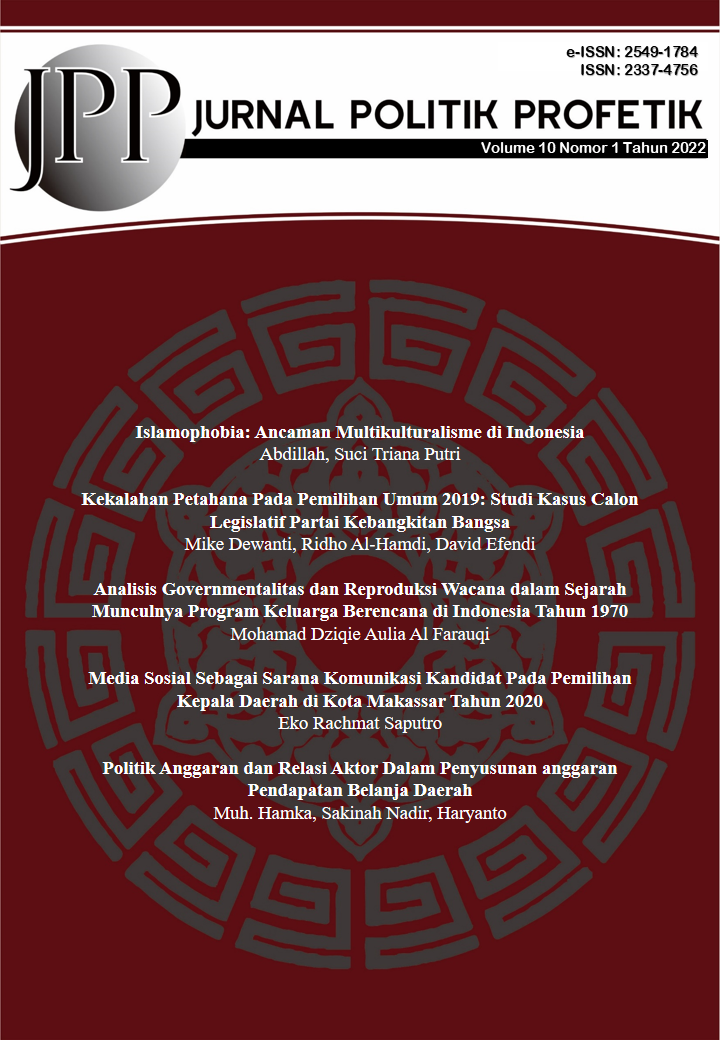POLITIK ANGGARAN DAN RELASI AKTOR DALAM PENYUSUNAN ANGGARAN PENDAPATAN BELANJA DAERAH
Abstract
The making of regional budgets involves several actors who have an interest in the Regional Revenue and Expenditure Budget (APBD). The relationship between each actor forms a structured and systematic network and arranges strategies to accommodate the interests of actors in the APBD. This article aims to explain how the relationship between actors and budget politics forms interests in the making of the APBD. The research method used is qualitative with a descriptive analysis type to describe the relationship of each actor by using actor-network theory and public policy. The results of the study found that the actors involved in the making of regional budgets were grouped into two, namely formal actors and informal actors. The main actors who dominate the making of regional budgets are the regional head as the highest decision holder and family relations as informal actors who influence decision making. Each actor forms a network to accommodate their interests in the APBD by strengthening their relationship with the highest decision-makers in regional budgeting. The strategy of actors in entering and guarding their interests in the APBD uses four political strategy frameworks, namely position strategy, power strategy, player strategy, and perception strategy. This article contributes to understanding that APBD budget politics cannot be separated from the role of formal actors and informal actors who have formed networks in guarding their respective interests.
Downloads
References
Creswell, John W. Research Design: Pendekatan Kualitatif, Kuantitatif dan Mixed. Yogyakarta: Pustaka Pelajar, 2012.
Danastri, Ningrum & Agus Machfud Fauzi, “Jaringan Sosial Pengusaha Tionghoa di Kota Surabaya” dalam Paradigma, Vol. 10, No. 1 (2021), h. 1-20.
Denhardt, Robert B. & Janet V. Denhardt, Public Administration: An Action Orientation, 6th Ed. USA: Thomson Wadsworth, 2009.
Fauzi, Achmad Nur & Dewi Rostyaningsih. “Analisis Peran Aktor Dalam Formulasi Kebijakan Semarang Smart City” dalam Journal Of Public Policy And Management Review, Vol. 7, No. 4 (2018), h. 1-18.
Hanida, Rozidateno Putri. “Dinamika Penyusunan Anggaran Daerah: Kasus Proses Penetapan Program Dan Alokasi Anggaran Belanja Daerah Di Kabupaten Sleman” dalam Jurnal Penelitian Politik, Vol 7, No 1 (2010), h. 74.
Herzon Y. “Politik Anggaran: Studi Tentang Proses Perumusan Kebijakan Anggaran Belanja Langsung SKPD dalam Penyusunan APBD Tahun 2011 Di Kabupaten Kerinci Provinsi Jambi”. Tesis. Yogyakarta: Magister Administrasi Publik, Universitas Gadjah Mada Yogyakarta, 2011.
Maulana, Delly. “Konflik dan System Nilai dalam Proses Penyusunan Kebijakan Anggaran Pendapatan dan belanja daerah (APBD) di Pemerintahan Daerah Provinsi Banten” dalam Journal of Indonesia Public Administration and Governance Studie (JIPAGS), Vol. 4, No. 1 (2020), h. 707-719.
Norton, Andy & Diane Elson. What’s Behind The Budget?: Politics, Right and Accountability In The Budget Process. London, UK: Overseas Development Institute, 2002.
Pratikno. “Peningkatan Kapasitas Berjejaring Dalam Tata Pemerintahan Yang Demokratis” dalam Wahyudi Kumorotomo & Ambar Widaningrum (ed.). Reformasi Aparatur Negara Ditinjau Kembali. Yogyakarta: Gava Media, 2010.
Pritasari, Luqyana Amanta & Bevaola Kusumasari. “Intervensi Aktor Dalam Mempengaruhi Formulasi Kebiajkan Lingkungan: Studi Kasus Kebijakan Relokasi Tambak Udang Di Yogyakarta” dalam Jurnal Borneo Administrator, Vol. 15, No. 2 (2019), h. 179-198.
Roberts, Marc, William Hsiao, Peter Berman & Michael Reich. Getting Health Reform Right. Oxford: Oxford University Press, 2002.
Rubin, Irene S. The Politics Of Public Budgeting: Getting And Spending, Borrowing and Balancing. Chatham: Chatham House, 2006.
Saunders, Benjamin, Jenny Kitzinger & Celia Kitzinger. “Anonymising Interview Data: Challenges And Compromise In Practice” dalam Qualitative Research, Vol. 15, No. 5 (2015), h 616-632.
Suwitri, Sri. “Jejaring Kebijakan Dalam Perumusan Kebijakan Publik (Suatu Kajian Tentang Perumusan Kebijakan Penanggulangan Banjir dan Rob Pemerintah Kota Semarang)” dalam Jurnal Delegasi STIA Banjarmasin, Vol. 6 No. 3 (2008), h.1-32.
Taufik. “Studi Jaringan Aktor dalam Perumusan Kebijakan Publik” dalam AL-IJTIMA'I-International Journal of Government and Social Science, Vol. 2, No. 2, (2017), h. 219-234.















